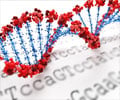A research team says that curing many genetic diseases will take much longer than expected, as understanding how mutations in the genetic code lead to these diseases will be much more
A research team says that curing many genetic diseases will take much longer than expected, as understanding how mutations in the genetic code lead to these diseases will be much more complicated than previously believed.
Dr. Tim Nilsen, a professor of medicine and biochemistry and the director of the School of Medicine's Center for RNA Molecular Biology, came to this conclusion after studying an unexpected mechanism governing alternative splicing, a process by which single genes produce different proteins in different situations.The researcher says that curing more than half of genetic diseases caused by mutations in the genetic code, which in turn create mistakes in alternative splicing, may be considerably more complicated.
The diseases include a large number of cancers and many neurodegenerative diseases.
While alternative splicing creates needed proteins, but it can also lead to problems
Mistakes in alternative splicing caused by changes (mutations) in DNA sequences create more than half of all genetic diseases.
For instance, sometimes the resulting mRNA includes nucleotide sequences that should have been deleted.
Advertisement
In their study, the researchers found that more than 130 potential mRNA's could be prevented from being manufactured.
Advertisement
Nilsen said that if one considers the metaphor that pre-mRNA is a long sentence, then nucleotides and splice sites are the words of the sentence.
"Adding or deleting one word can radically change the meaning of the sentence," he said.
The research, titled "Dynamic regulation of alternative splicing by silencers that modulate 5' splice site competition" is published in the latest issue of Cell.
Source-ANI
SK















